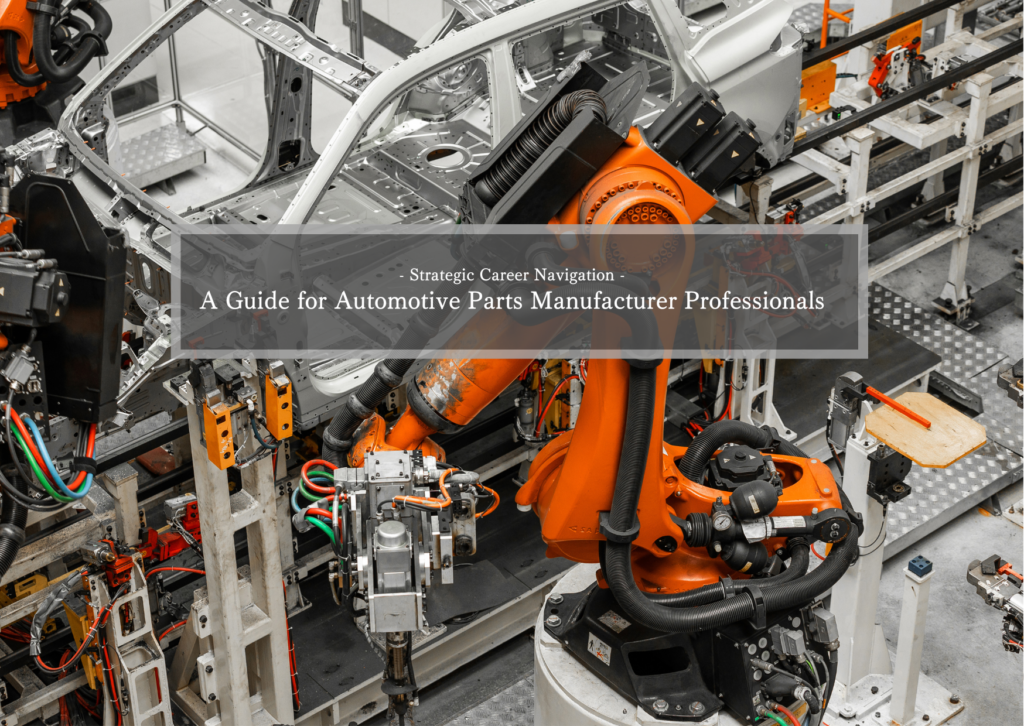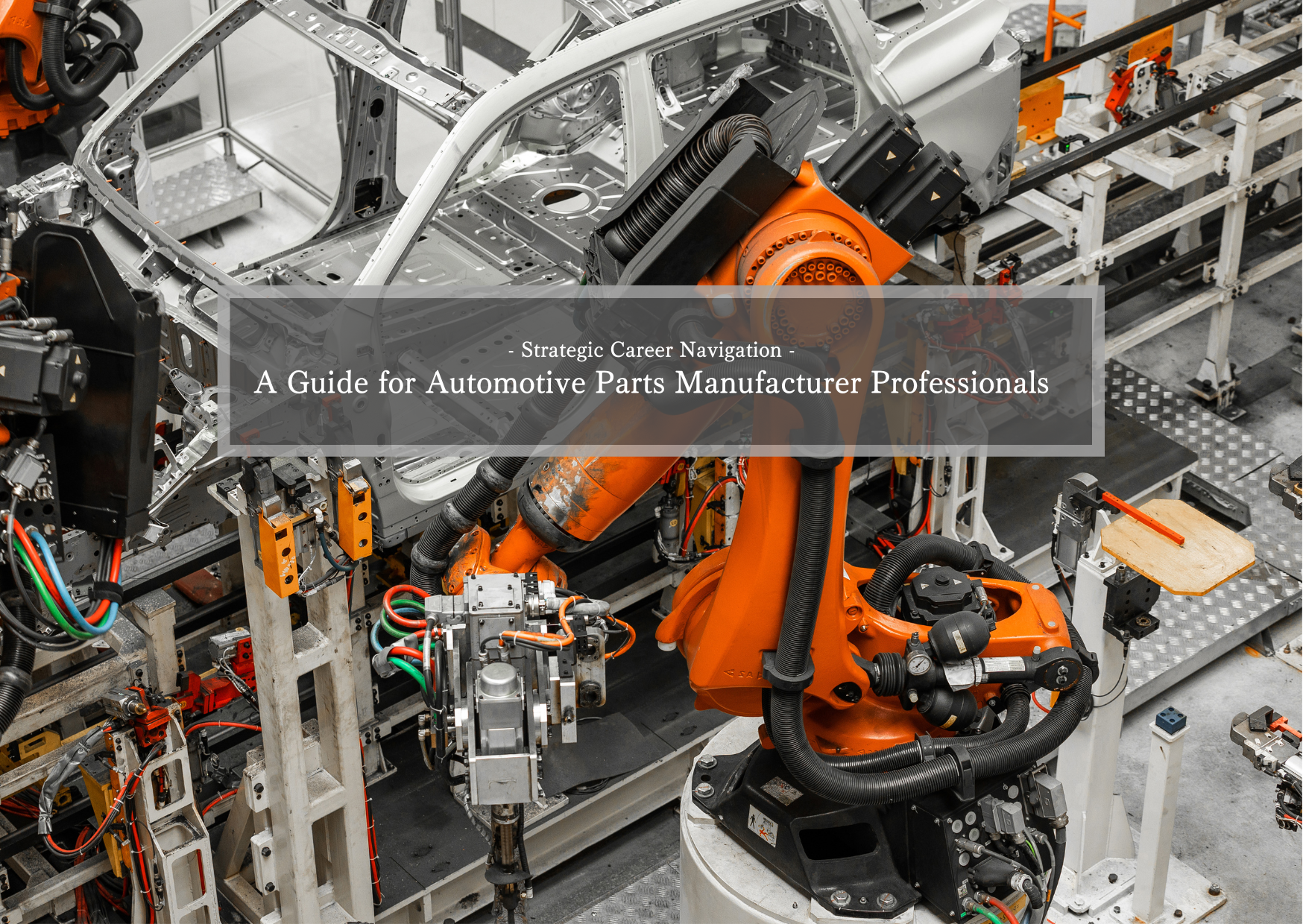07 Dec Strategic Career Navigation | A Guide for Automotive Parts Manufacturer Professionals

Contents
- Current State and Future Prospects of the Automotive Industry
- Reasons for Changing Jobs from the Automotive Industry
- Is a Career Shift Possible from Automotive (Parts) Manufacturers to Other Industries?
- Career Options after Leaving an Automotive (Parts) Manufacturer
- Tips for a Successful Career Transition from an Automotive(Parts) Manufacture
- Conclusion
People working in the automotive industry often have a passion for cars and take pride in Japan’s automotive achievements. However, some may find the reality different from their expectations or have concerns about the industry’s future depends on where they work, leading them to consider a career change.
This article focuses on transitioning from automotive parts manufacturers. We will dive into the available options for your subsequent career move outside the automotive industry and tips for a successful job change. If you’re contemplating a change or feeling uncertain about your current situation, this guide is for you.
1. Current State and Future Prospects of the Automotive Industry
People working in the automotive industry often have a passion for cars and take pride in Japan’s automotive achievements. However, some may find the reality different from their expectations or have concerns about the industry’s future depending on the specific segment of the automotive sector in which they work. , leading them to consider a career change.
This article focuses on transitioning from automotive parts manufacturers. We will dive into the available options for your subsequent career move outside the automotive industry and tips for a successful job change. If you’re contemplating a change or feeling uncertain about your current situation, this guide is for you.
What is CASE?
CASE stands for Connected, Autonomous, Shared, Electric, representing:
- Connected: Cars constantly connected to the internet
- Autonomous: Shift from manually driven to self-driving vehicles
- Sharing: Moving from individual car ownership to shared usage
- Electrification: Transition from gasoline and hybrid vehicles to Electric Vehicles (EVs)
2. Common Reasons for Changing Jobs from the Automotive Industry
There are three main reasons people want to change jobs from the automotive industry:
-
- Concerns about the future prospects of their current company
- Limited opportunities for job variety and skill development
- Stagnant salaries and outdated corporate culture and evaluation system
♦ Concerns About the Future Prospects of Their Current Company
The first reason is concerns about the future of the company they currently work for. As mentioned earlier, the automotive industry is in a transitional phase. Intense competition among manufacturers, challenges like price wars impacting subcontractors, and a shift towards electrification are just some of the issues. Electrification, for instance, has led to a reduction in the number of auto parts needed, demanding significant changes in established production systems. Disappointment with these industry trends or company policies is driving some people to seek opportunities in different industries.
♦ Limited Opportunities for Job Variety and Skill Development
Many Japanese automotive parts manufacturers are large and have highly specialized roles and job functions. This specialization can limit the scope of an individual’s role, making it difficult to acquire a broad range of skills outside their specific area. Those who feel unfulfilled in their current role or see a ceiling to their career growth may view a job change as a way to realize their ambitions.
♦ Stagnant Salaries and Outdated Corporate Culture
The Japanese automotive parts industry, with its long history, often retains traditional practices, including seniority-based systems and evaluation methods that don’t reflect in salaries, leading to dissatisfaction among employees. Even with the shift towards job-based employment, salary growth is often constrained by age.
In contrast, foreign automotive companies are significantly raising salaries to attract IT talent and offer more equitable evaluation systems, making them an attractive alternative for those seeking change.
3. Is a Career Shift Possible from Automotive (Parts) Manufacturers to Other Industries?
As mentioned, many employees in automotive manufacturers develop specialized skills in specific fields, making them highly capable experts.
For example, those experienced in designing and developing automotive parts can transition to roles in electronics or mechanical parts design in other industries. Furthermore, their knowledge of efficient business processes and production management is highly valued. Positions like production managers or program managers are in demand in consulting and IT solutions companies catering to the manufacturing sector. This demonstrates that the skills and experiences gained in the automotive industry are not only applicable but also highly valued outside of it, giving professionals the confidence to pursue opportunities in different fields and industries.
4. Career Options After Leaving an Automotive (Parts) Manufacturer
Many people may struggle to envision how their experience and skills in the automotive industry can be leveraged elsewhere.
Here, we introduce specific career paths for those considering leaving an automotive parts manufacturer. Whether you’re aiming for higher salaries or career advancement, this guide can help shape your career plan.
Startups
Recommended age: 20s to 40s
This is recommended for those in their 20s to 40s who want to expand their discretion and seek skill advancement through challenges. The government is also increasing its supplementary budget to 1 trillion yen for a five-year startup nurturing plan. The amount of funding for domestic startups has reached a record high, with 877.4 billion yen collected in 2022. Globally, startups like Tesla in electric vehicles and autonomous driving are emerging rapidly. In Japan, with an emphasis on job-based employment, these startups also provide an environment conducive to acquiring practical skills.
< Key Points to Consider >
Automotive and mobility-related startups are characterized by their rapid growth. The possibility of business integration or acquisitions means job roles can change regardless of the initial position, requiring flexibility to adapt to such changes.
Consulting Firms
Recommended age: 20s to 30s
Ideal for those who want to quickly upgrade their skills and increase their salary. Automotive manufacturers’ experience is highly valued, expanding future career opportunities.
< Key Points to Consider >
In strategy consulting firms, achieving results within a fixed period is crucial, often leading to long working hours. However, working closely with talented superiors and colleagues can significantly boost your skills and salary in a short period.
Foreign Companies
Recommended age: 20s to 50s
Suitable for those who want to leverage their English skills and prefer a fair evaluation system for salary increments. Plenty of opportunities for job changes even in your 50s.
< Key Points to Consider >
Foreign companies often seek immediately effective talents. Smaller companies may not offer extensive training, making early career stages, like in your 20s, a challenge. However, possessing a strong skill set can turn youth into an advantage.
IT Industry
Recommended age: 20s to 50s
A career advancement opportunity for those with IT-related knowledge. Especially for those with electrical/electronics or software experience, aiming for a higher salary and specialization in the IT industry is feasible.
< Key Points to Consider >
In the IT industry, even in planning or sales roles, IT-related experience can be a requirement. Gaining experience in electrical fields or consulting firms before transitioning to the IT industry is also a viable approach.
5. Tips for a Successful Career Transition from an Automotive (Parts) Manufacturer
To successfully transition from an automotive parts manufacturer, several key points should be considered. These can guide you through your job search.
Clarify How You Can Contribute
Mid-career hires are generally expected to be immediately effective. While industry-crossing used to result in stagnant salaries due to lack of industry experience, today, leveraging previous experiences and skills to address a company’s challenges can lead to successful transitions, regardless of industry or sector. Assess your skills and strengths, and clearly define how you can contribute to a potential employer. Ensure that the hiring side can envision a positive change with your inclusion.
Set a Clear Minimum Salary Threshold
A career change can lead to either an increase or decrease in salary. Experiences or roles that don’t align with the new company’s requirements often result in lower salaries. Of course, accepting a lower salary can sometimes lead to better long-term career prospects or improved work-life balance. However, realistically, a decrease in salary can affect the quality of life or even lead to unsustainable living conditions. Money matters should be considered seriously. Determine your lowest acceptable salary threshold in advance and only accept offers that meet your criteria.
Utilize Recruitment Agencies
Job hunting requires considerable time and effort, especially while working. Using a recruitment agency can make this process more efficient. Agencies can match you with suitable job openings, offer interview preparation, and provide various other forms of support.
Turnpoint Consulting is a recruitment agency specialized in the automotive, IT, technology, and mobility services industries. We offer advice based on industry salary averages, competitive pay, and latest trends. With detailed interviews and tailored interview preparation, we provide comprehensive support to guide job seekers to their ideal career change.
6. Conclusion
Currently, the automotive industry is at a major crossroads, facing an uncertain future. Many people might feel anxious about the future prospects of their current company or the automotive parts manufacturing sector as a whole.
However, there are ample opportunities to leverage the experience and skills gained in automotive parts manufacturing.
Why not seek a new job in a high-potential industry or company that aligns with your aspirations, such as a desire for a higher salary or a change of environment, especially if these goals are unattainable in your current position? A career change might be the key to enriching your daily life.






